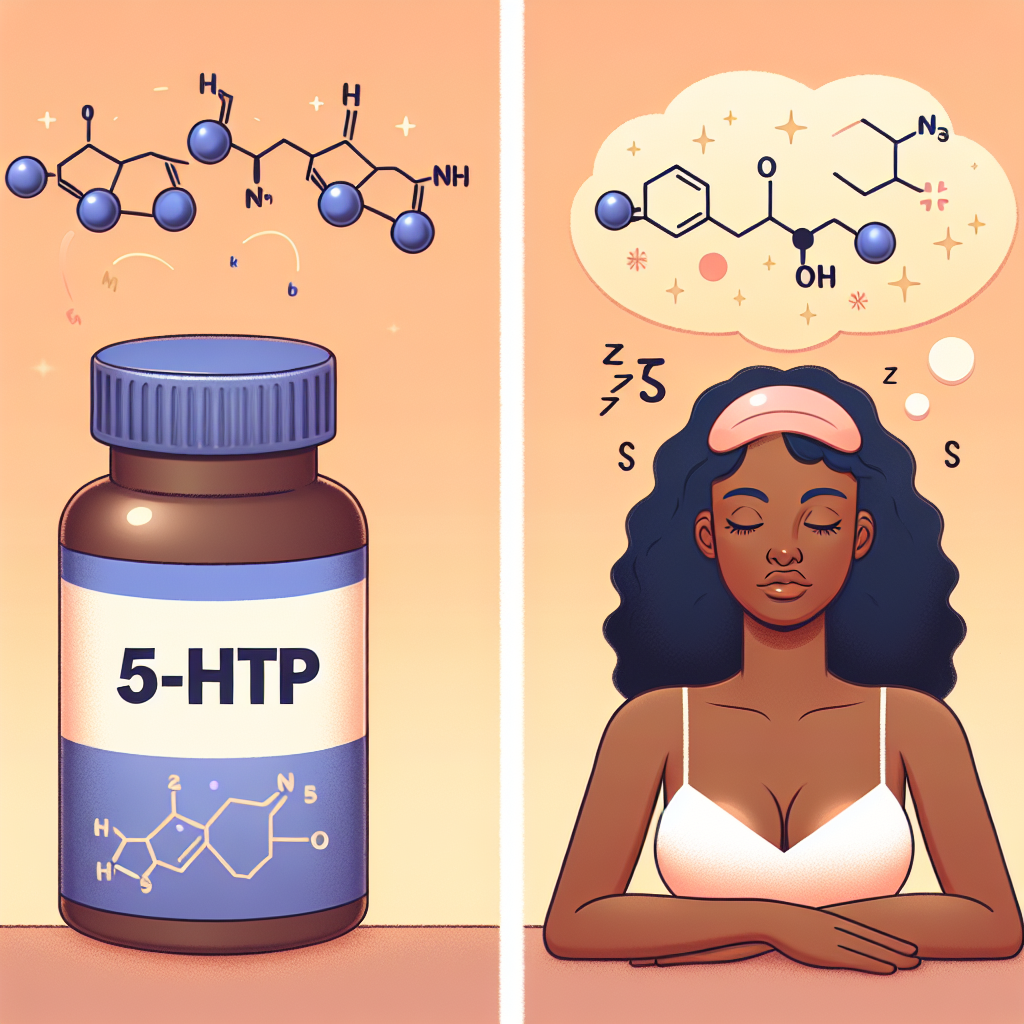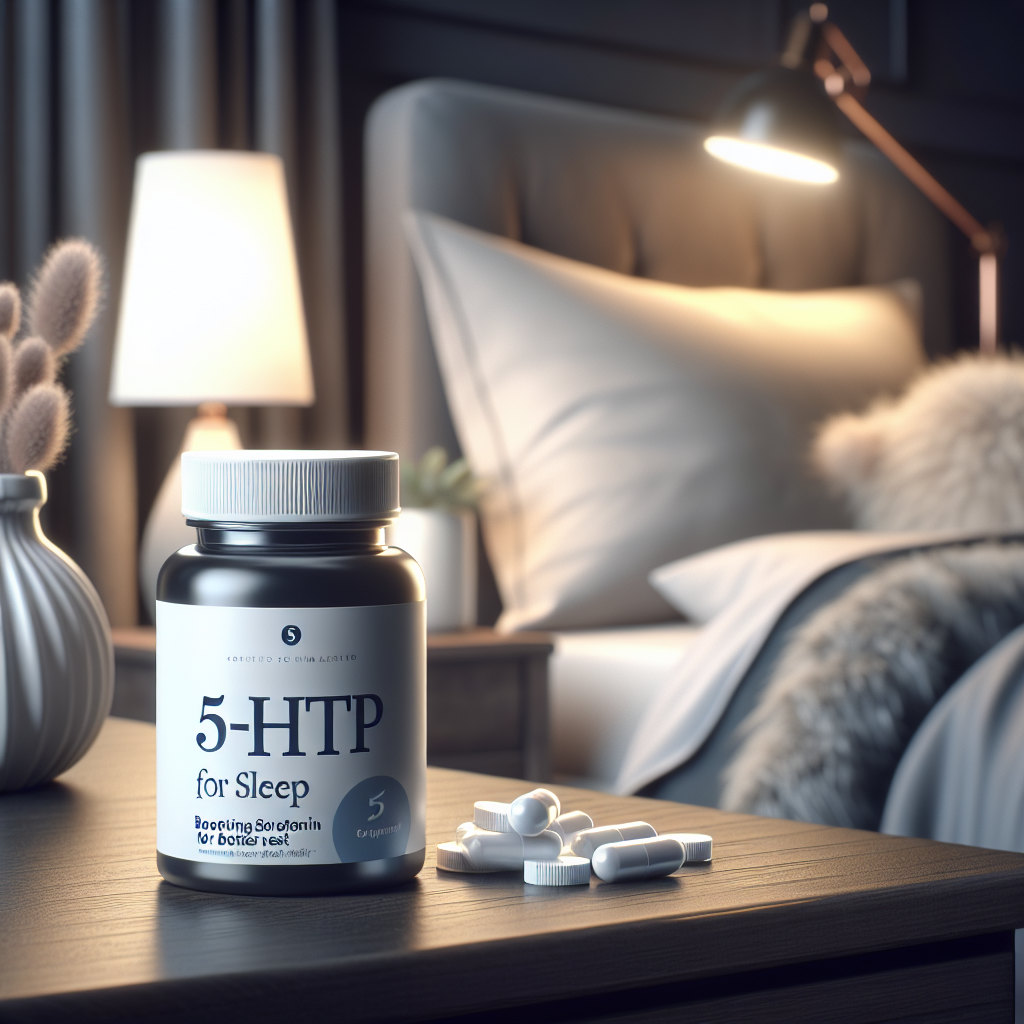5-HTP for Sleep: Boosting Serotonin for Better Rest

The Science Behind 5-HTP: How It Improves Sleep Quality
5-Hydroxytryptophan, commonly known as 5-HTP, has garnered attention for its potential to enhance sleep quality, a crucial aspect of overall health and well-being. This natural compound, derived from the seeds of the African plant Griffonia simplicifolia, plays a pivotal role in the human body’s serotonin production, a neurotransmitter often dubbed the “feel-good” chemical. Understanding the science behind 5-HTP and its impact on sleep involves delving into the complex interplay between serotonin levels and sleep regulation, a topic that has intrigued researchers and healthcare professionals alike.
Serotonin, aside from its well-known effects on mood and behavior, exerts a significant influence on sleep patterns. It serves as a precursor to melatonin, the hormone directly responsible for regulating sleep-wake cycles. In essence, adequate serotonin levels in the brain are essential for the production of melatonin, setting the stage for a restful night. However, various factors, including stress, dietary deficiencies, and lifestyle choices, can disrupt serotonin synthesis, leading to imbalances that adversely affect sleep. This is where 5-HTP steps in, acting as a critical intermediary in the conversion of tryptophan, an amino acid obtained from diet, into serotonin.
The supplementation of 5-HTP has been shown to effectively increase serotonin levels, thereby enhancing the production of melatonin and improving sleep quality. Clinical studies have provided evidence supporting the efficacy of 5-HTP in reducing the time it takes to fall asleep, increasing sleep duration, and improving sleep depth. These benefits are particularly valuable for individuals experiencing sleep disorders such as insomnia, where serotonin and melatonin imbalances are often implicated.
Moreover, 5-HTP’s role in boosting serotonin levels not only aids in sleep regulation but also offers a holistic approach to improving mental health. Elevated serotonin levels can alleviate symptoms of depression and anxiety, conditions frequently associated with sleep disturbances. By addressing these underlying issues, 5-HTP can contribute to a more restorative sleep experience, highlighting its dual function in enhancing both psychological well-being and sleep quality.
It is important to note, however, that while 5-HTP presents a promising solution for sleep-related issues, its supplementation should be approached with caution. The compound’s interaction with other medications, particularly those affecting serotonin levels, necessitates professional guidance to avoid adverse effects. Additionally, the optimal dosage of 5-HTP can vary among individuals, underscoring the importance of consulting with a healthcare provider to determine the appropriate regimen.
In conclusion, the science behind 5-HTP and its role in improving sleep quality is rooted in its capacity to boost serotonin production, a key factor in regulating sleep-wake cycles through the subsequent increase in melatonin levels. By addressing serotonin imbalances, 5-HTP offers a natural and effective means of enhancing sleep, with the added benefit of potentially improving mental health. As research continues to unfold, the understanding of 5-HTP’s mechanisms and its broader implications for sleep and health will undoubtedly expand, offering new insights into the intricate relationship between neurotransmitters and sleep.
Comparing 5-HTP and Prescription Sleep Aids: What You Need to Know

In the quest for a good night’s sleep, many individuals turn to various supplements and medications, seeking relief from insomnia and other sleep disturbances. Among these, 5-Hydroxytryptophan (5-HTP) has emerged as a popular choice for those looking to enhance their sleep quality naturally. This compound, a precursor to serotonin, plays a pivotal role in regulating mood and sleep patterns. However, when considering 5-HTP, it’s essential to compare its effects and safety profile with those of prescription sleep aids, to make an informed decision about which might be the best option for improving rest.
5-HTP works by increasing the body’s production of serotonin, a neurotransmitter that significantly influences sleep, mood, and anxiety levels. The rationale behind using 5-HTP for sleep improvement lies in its potential to boost serotonin levels, thereby promoting relaxation and facilitating better sleep. Unlike many prescription sleep aids that directly induce sleep by acting on the central nervous system, 5-HTP aims to address the underlying imbalance in serotonin levels that may contribute to sleep problems.
Prescription sleep aids, on the other hand, often come in the form of sedative-hypnotics or antidepressants that directly affect the brain’s neurotransmitter activity to induce sleep. While these medications can be highly effective in the short term, they may also carry a risk of side effects such as daytime drowsiness, dizziness, and potential dependency. Furthermore, prescription sleep medications typically target the symptoms rather than the root cause of sleep disturbances, which may limit their effectiveness in long-term management of sleep issues.
The comparison between 5-HTP and prescription sleep aids reveals a fundamental difference in approach: 5-HTP offers a more natural pathway to improving sleep by supporting the body’s serotonin production, whereas prescription medications often provide a more immediate but potentially less sustainable solution. This distinction is crucial for individuals seeking a long-term strategy for enhancing sleep quality without the risk of dependency or adverse effects.
However, it’s important to note that 5-HTP is not without its own considerations. While generally considered safe for short-term use, 5-HTP can interact with certain medications, particularly those that also influence serotonin levels, such as antidepressants. Therefore, consulting with a healthcare provider before starting 5-HTP, especially for individuals already taking other medications, is essential to avoid potential interactions and ensure safety.
In conclusion, when comparing 5-HTP with prescription sleep aids, the choice ultimately depends on individual needs, preferences, and medical history. 5-HTP presents an appealing option for those seeking a more natural approach to improving sleep by addressing serotonin imbalances. In contrast, prescription sleep aids may offer a more direct, albeit potentially less sustainable, path to better rest. Regardless of the choice, it’s imperative to approach sleep enhancement with a holistic perspective, considering lifestyle factors such as diet, exercise, and stress management, which play significant roles in achieving optimal sleep health. By weighing the benefits and limitations of 5-HTP against those of prescription sleep aids, individuals can make an informed decision that aligns with their health goals and leads to improved sleep and overall well-being.
Maximizing the Benefits of 5-HTP for a Restful Night’s Sleep
5-HTP for Sleep: Boosting Serotonin for Better Rest
In the quest for a restful night’s sleep, many individuals turn to various supplements and remedies. Among these, 5-Hydroxytryptophan, commonly known as 5-HTP, has garnered attention for its potential to enhance sleep quality. This naturally occurring amino acid plays a pivotal role in the human body’s serotonin production, a neurotransmitter that impacts everything from mood to sleep. Understanding how to maximize the benefits of 5-HTP can be a game-changer for those struggling to find peace in their nightly rest.
The connection between 5-HTP and sleep stems from its influence on serotonin levels. Serotonin, often referred to as the “feel-good” neurotransmitter, is not only crucial for mood regulation but also plays a significant role in sleep patterns. It serves as a precursor to melatonin, the hormone directly responsible for sleep-wake cycles. Therefore, by boosting serotonin production, 5-HTP indirectly increases melatonin, facilitating easier and more restful sleep.
However, to truly harness the sleep-promoting benefits of 5-HTP, it’s essential to consider dosage and timing. Research suggests that the effectiveness of 5-HTP in improving sleep quality is dose-dependent, with higher doses potentially offering more significant benefits. Typically, doses range from 100 to 300 mg, taken approximately 30 minutes to an hour before bedtime. This timing allows the body to convert 5-HTP into serotonin and subsequently melatonin, aligning with the body’s natural preparation for sleep.
Moreover, combining 5-HTP with other natural sleep aids can enhance its effectiveness. For instance, magnesium and vitamin B6 have been shown to support serotonin production, potentially amplifying the benefits of 5-HTP. Incorporating these supplements into a nightly routine, alongside 5-HTP, may offer a synergistic effect, promoting deeper and more restorative sleep.
It’s also worth noting the importance of consistency when using 5-HTP for sleep. As with many supplements, the benefits of 5-HTP may not be immediately apparent. Regular use, over a period of weeks, is often necessary to observe a noticeable improvement in sleep quality. This gradual approach allows the body to adjust to increased serotonin levels, facilitating a natural enhancement of sleep patterns over time.
However, while 5-HTP presents a promising solution for sleep issues, it’s crucial to approach its use with caution. Individuals with existing health conditions or those taking medications, particularly those affecting serotonin levels, should consult with a healthcare provider before incorporating 5-HTP into their regimen. This precaution ensures the safe and effective use of 5-HTP, avoiding potential interactions or side effects.
In conclusion, 5-HTP offers a natural avenue for improving sleep quality through its role in serotonin production. By understanding the optimal dosage, timing, and complementary supplements, individuals can maximize the sleep-promoting benefits of 5-HTP. Consistency and caution are key to safely enhancing sleep with 5-HTP, paving the way for more restful nights and brighter days. As the understanding of 5-HTP’s role in sleep continues to evolve, it remains a valuable tool in the pursuit of optimal rest and well-being.